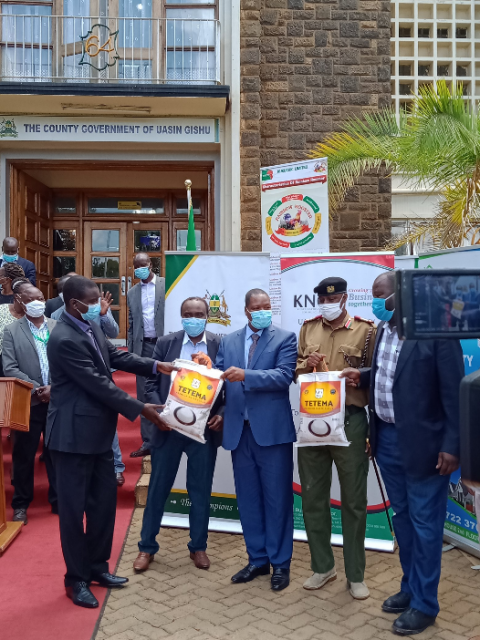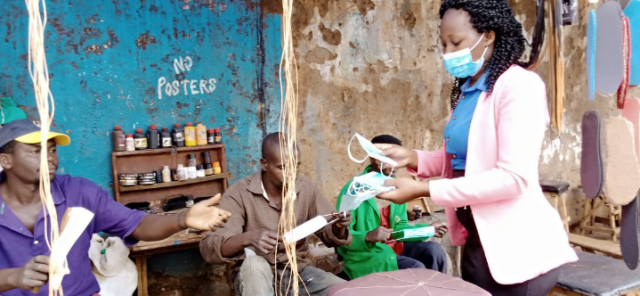In Kenya, with the devolution of government, county chambers of commerce are playing an increasingly important role in serving and advocating on behalf of small businesses. Several years ago, CIPE sought to find out which county chambers among Kenya’s 47 counties demonstrated the greatest potential for impact and growth. We identified three outstanding chambers who have become part of our Centers of Excellence program: the Mombasa, Embu, and Uasin Gishu chambers of commerce.

Uasin Gishu Chamber of Commerce – Representing Kenya’s breadbasket county in the Rift Valley, the Uasin Gishu Chamber has 2,400 members. With the arrival of the COVID-19 pandemic, the chamber quickly responded to the challenges faced by members and the larger community.
The chamber built a successful long-term partnership with Moi University to collaborate on serving the local business community. Together they conducted a survey on the effects of COVID-19 on businesses in Uasin Gishu, developed recommendations, and dialogued with the county government on the development of an economic support and recovery plan.
In response, the chamber, county government, and other stakeholders established a COVID-19 economic recovery committee. The chamber successfully advocated for the county government to postpone business permit fees, convinced landlords to provide rent relief, and mobilized chamber members to donate food and household goods to the county’s most vulnerable people. The chamber also identified small business members in the textiles and apparel sectors and linked them as sub-contractors to the textile company Rivatex to sew masks that had been ordered by the national government.
You can listen to CIPE’s podcast interview with the chamber CEO about the chamber’s COVID-19 response here. Recently, the chamber conducted a membership survey on member needs, developed a business information center and helpdesk to serve as a hub of information for its members, and has been working with the Kenyan Fresh Foods Consortium (KFFC) and neighboring counties to develop the airport in Eldoret town as a key export hub to regional and international markets. The chamber also recently launched the findings of their Big Four Agenda Scorecard which assessed county budgets and project implementation according to the national government’s economic development blueprint for universal healthcare, food security, manufacturing and affordable housing.

Mombasa Chamber of Commerce – Representing Kenya’s second largest economy and its largest port, the Mombasa Chamber, with 320 members, plays an important role in Mombasa, as well as Kenya’s national economy. During the COVID-19 crisis, the chamber played a critical role liaising with government and the local community.
The chamber took the lead in sensitizing businesses about COVID-19 and collaborated with the government on its nutrition relief program, mobilizing resources and collecting 200 million Kenyan schillings (almost $2 million USD) for the program. Ramping up its engagement on county budget issues, the chamber is now an active participant in the County Budget Economic Forum, the highest level of budget decision making in the county. This has provided the private sector in Mombasa with a voice on key budget decisions made by the county government.
Recently, the chamber has held important roundtable discussions with the Kenya Revenue Authority on bottlenecks at the Mombasa port and with Safaricom to discuss how one of Kenya’s largest businesses can support SMEs facing challenges due to COVID-19. The chamber also recently launched the findings of their Big Four Agenda Scorecard which assessed county budgets and project implementation according to the national government’s economic development blueprint for universal healthcare, food security, manufacturing and affordable housing.

Embu Chamber of Commerce – Located in the Mount Kenya region, the Embu Chamber has a membership of almost 1,000 and represents an economy largely driven by agriculture, particularly coffee, tea, and cotton.
At the beginning of the COVID-19 pandemic, the Embu Chamber partnered with the Department of Health to educate SMEs on preventing COVID-19, identify traders who had traveled abroad and convince them to get tested, and worked with traders to help them relocate in order to decongest markets. The chamber provided businesses with sanitation products such as soap and water tanks, which enabled businesses to continue operating. The chamber was also the only organization in Embu that was able to provide businesses with travel passes during the country’s COVID-19 lockdown.
The Embu Chamber has worked tirelessly in advocating for SMEs in Embu county. The chamber convinced the government to waive licensing fees during COVID-19, persuaded the government to allocate $100,000 towards the first phase of reconstructing a destroyed market, and has been engaging the county government about the Embu County Revenue Authority (ECRA) harassing traders.
The chamber also represents business in the Ministerial County Inter-Agency Committee (MCIAC), a public-private sector coalition advancing economic interests in the county. The chamber also recently launched the findings of their Big Four Agenda Scorecard which assessed county budgets and project implementation according to the national government’s economic development blueprint for universal healthcare, food security, manufacturing and affordable housing.
Published Date: May 07, 2021